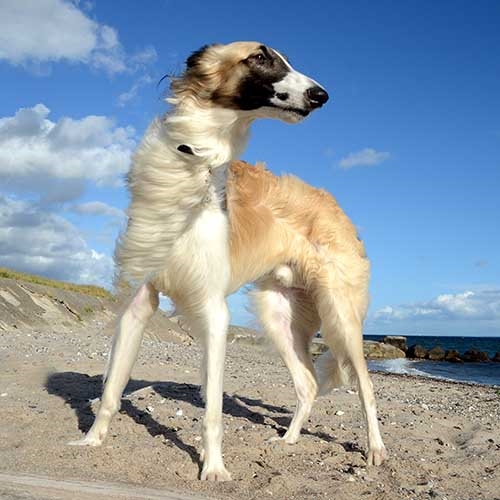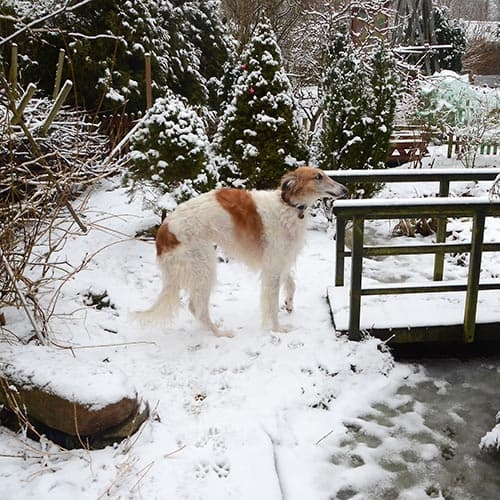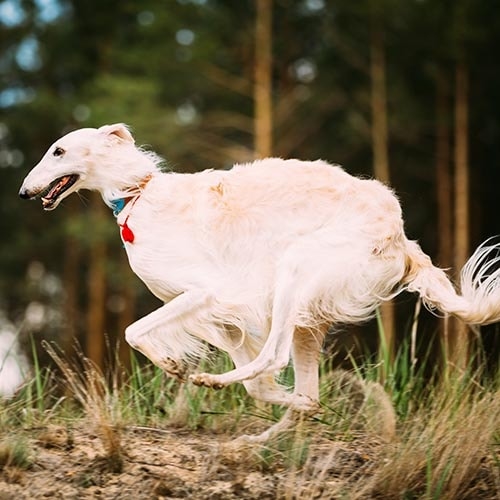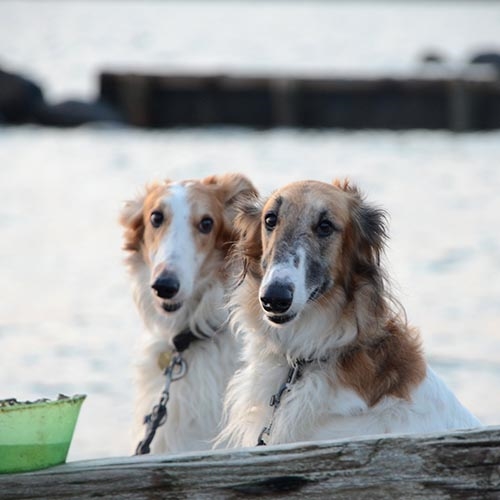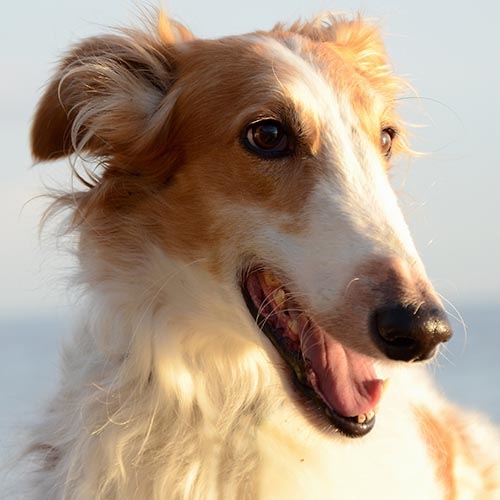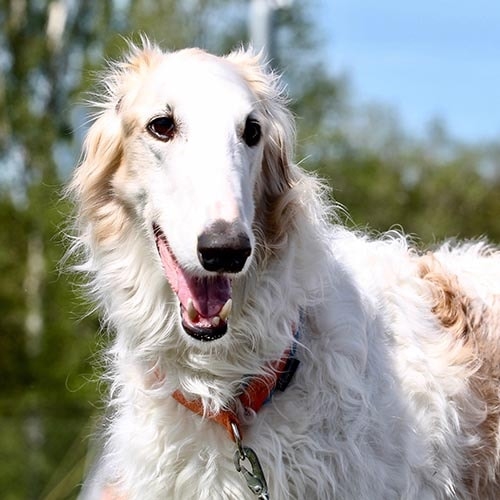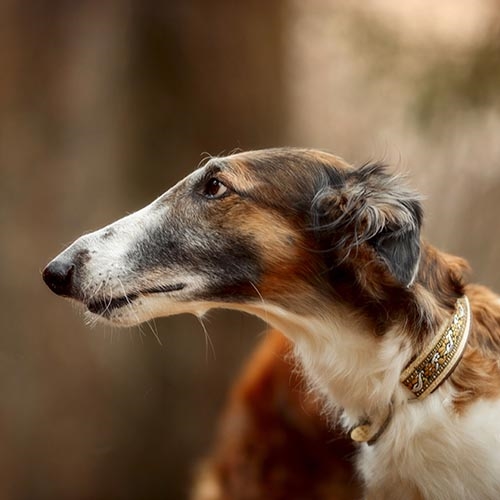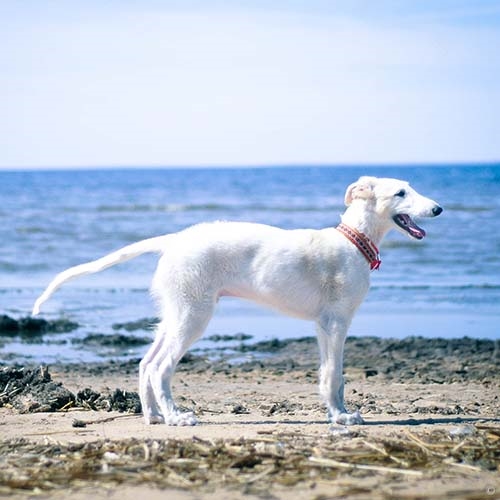| Size | Large |
|---|---|
| Average height | 68-74 cm |
| Average weight | 27-47 kg |
| Average lifespan | Over 10 years |
| Minimum exercise (per day) | 1 hour |
| Coat length | Medium |
| Minimum cost (per month) | £80 |
Borzois, also known as ‘Russian Wolfhounds’, are large and active dogs who really thrive off human company. They are known to be affectionate and calm pets (as long as they are getting plenty of exercise!).
Originally bred as sighthounds, Borzois suit active and outdoor-loving owners really well. They have a lot of energy and certainly need a lot of space, so a big house and garden is the perfect environment for a Borzoi.
Common health problems in Borzois
Borzois can make affectionate and loving pets in the right household. Sadly, like many other purebred dogs, they are prone to certain conditions.
If you are thinking of buying a Borzoi puppy, make sure the parents of your puppy have had the relevant health screening to reduce the chances of your puppy being affected by certain conditions. We’d recommend looking for a Kennel Club Assured Breeder as they meet extra requirements which will benefit your puppy’s health.
Borzois are amongst a group of breeds classed as ‘Category Two’ by The Kennel Club. These are breeds of dog that have been highlighted as having ‘points of concern’ – visible features which, if exaggerated, might potentially affect the breed in the future and cause health and welfare concerns. In the case of Borzois, this is due to the shape of their mouth and jaw which can cause them painful dental problems.
Some of the conditions Borzois may develop include:
- Degenerative myelopathy – a disease of the spinal cord which progressively worsens affecting mobility. Parents can be DNA tested prior to breeding.
If you want to minimise the risk of your dog getting problems, you can read our advice on choosing a pedigree dog.
Caring for your Borzoi
Borzois can be very placid dogs, but do need plenty of exercise to keep happy and healthy. While they are very intelligent, they can also be strong-willed when it comes to training so may suit experienced owners better.
While Borzois can be a little wary of new people, once they get to know you they can be incredibly loving and loyal dogs. They can be quite sensitive in a physical sense which means knocks and bumps can cause them a lot more pain than other breeds, so owners need to be careful around them (especially when training them to walk nicely – any pulls on the lead can be very painful so it’s best to follow our reward-based training advice).
Borzois and barking
Your Borzoi is likely to make some noise and this will be down to their training and individual personality. No two dogs are the same when it comes to barking and noise. This said, they are not known to be big barkers and many owners report that their Borzoi rarely makes any noise at all. This is likely due to their breeding as sighthounds – they can be very quiet and stealthy when they want to! If you’re having problems with excessive noise, we recommend seeking the advice of an accredited behaviourist.
Training and socialisation
Borzois can be very independent thinkers, so it’s important to start positive, reward-based training from a young age. Borzois can be strong-willed with training and will often get distracted and run off if they see something more interesting so consistency and patience is a must! For this reason, Borzois suit experienced owners familiar with their needs. If you are a first time owner or need extra guidance, we’d recommend taking them to accredited training classes.
It’s important to socialise your Borzoi from a young age with lots of different people, dogs and experiences. Borzois can be nervous of strangers so this early socialisation is really important to help build their confidence.
Borzois form strong bonds with their owners and are known to suffer from separation anxiety if left alone. Ideally they need to be in a home where someone is around all the time, otherwise you may find they chew items around the home to let you know they’re upset.
Exercise
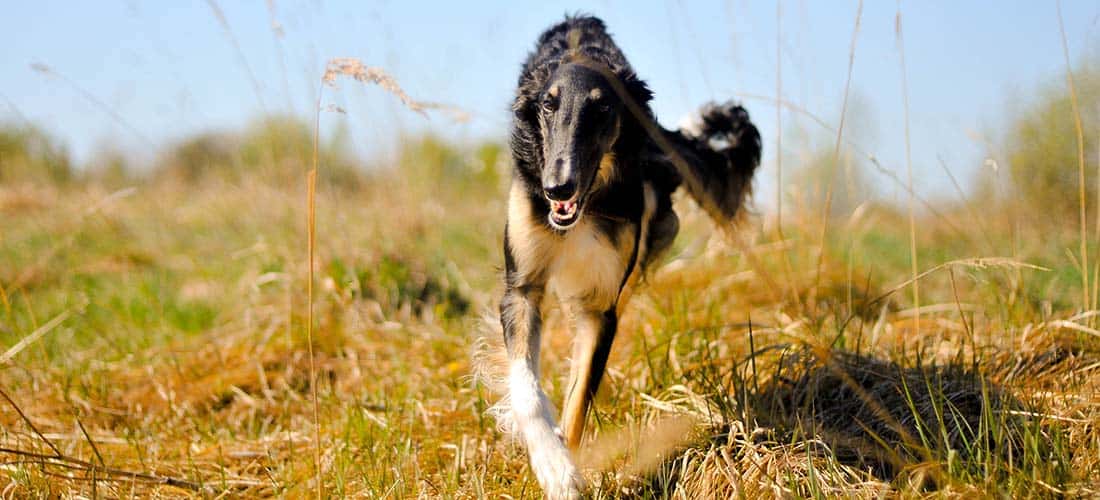
Borzois need plenty of exercise to keep them happy and healthy. They have a high prey drive and love to chase, so room to run in a secure environment is a must!
Your Borzoi will need a minimum of an hour exercise every day. This should be split into a couple of walks somewhere interesting with lots to sniff and explore. They’ll also need time to run around off-lead in a secure area.
On top of this, you’ll also need regular training sessions, lots of playtime and time for your Borzoi to mill around in a secure garden. Remember to keep a tight grip on your Borzoi’s lead out and about – if they see something that looks fun to chase they’re likely to take off without you!
Grooming
Borzois have longer fur which needs brushing a few times a week, possibly even more to make sure it doesn’t get matted. They do shed, as with any dog, but you can expect a lot more fur around the home during spring and autumn. Check out our blog for advice on staying on top of shedding.
To keep their coat in the best condition and as they’re such a large dog, you may want to get your Borzoi professionally groomed to keep on top of things. Speak to a professional groomer who can advise you about how often this should be.
Borzois and children
Borzois can be gentle dogs around children, but they prefer calmer households. They aren’t fans of rough play, which younger children may not understand, so we wouldn’t recommend a Borzoi if you have younger children. They suit adult only households or households with older children who understand how to treat them kindness and respect.
Remember to make sure you can recognise your dog’s body language so you can put a stop to any potentially stressful situations before they escalate. Always supervise your dog with children and vulnerable adults.
Borzois and other pets
Borzois can be a little wary of other dogs so you need to socialise your Borzoi with other dogs from a young age. They can be quite aloof even with this socialisation so you may find they prefer spending time with you over other dogs
Borzois do have a very high prey drive, so we wouldn’t recommend keeping them with smaller pets. They love to chase so you should always supervise your Borzoi around other pets.
Food
Your Borzoi’s diet will vary depending on their age. You’ll need to feed them a complete, balanced dog food to keep them slim and healthy.
Your vet will be able to tell you how much your Borzoi should be eating. You should feed them a good quality, commercially available, complete dog food. We usually recommend splitting their daily allowance into two meals. If you give your dog the occasional treat or use treats for training, remember to take this into account and reduce their daily allowance. Treats shouldn’t make up more than 10% of their daily calorie intake as this can unbalance their diet.
Try to feed your dog at similar times every day as they like routine. Remember to leave a gap between eating and exercising.
The cost of owning a Borzoi
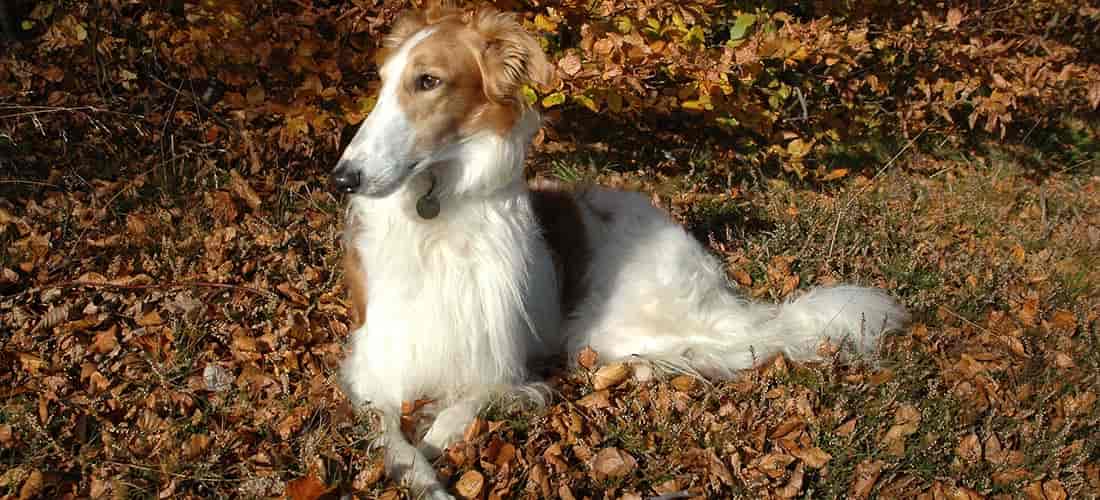
You can expect your Borzoi to cost you a minimum of £80 per month after purchase and set-up costs and over £13,000 across their lifetime.
Costs you’ll need to think about include:
Purchase costs
Adopting an adult Borzoi from a rescue centre may be a more cost-effective option, with the added advantage of giving a home to a pet without one – check if the rehoming centre you’re looking at asks for a donation for rehoming.
If instead you’re buying a Borzoi puppy from a breeder, you’ll need to factor in this cost. Beware unusually cheap puppies as they could come from a puppy farm. If you’d like to buy a pedigree puppy, we recommend looking for a Kennel Club Assured breeder. These breeders must do extra health tests and meet higher standards.
Set-up costs
- Puppy vaccines – if you rescue a dog, reputable centres will often vaccinate them for you. Remember that ongoing booster vaccinations will be needed to continue their immunity.
- Neutering – you should usually arrange for your dog to be neutered at around 6-12 months old, though your vet will be able to advise you exactly when is best. Check prices at your local practice as these will depend on your vet and where you live. Some rescue centres will neuter any dogs they rehome, saving you this cost.
- Equipment – including a collar and tags, lead, harness, dog beds, dog bowls, pet-safe toothpaste and toothbrushes, grooming brushes and toys. Keep in mind that all these will need to be replaced with wear or damage or if your dog outgrows or damages them!
Ongoing costs
- Food.
- Preventive healthcare – budget for routine vet visits to help stop your dog getting ill and catch any problems early. They need annual check-ups, vaccinations and regular flea and worming treatments. Check if your vet offers a health care plan as this can help spread the cost throughout the year.
- Vet bills* or pet insurance – if you don’t have pet insurance and your dog needs veterinary treatment for an injury or illness, costs can rapidly mount up. Check what’s covered and what isn’t when comparing policies.
- Accessories – including lots of poo bags, replacing worn toys and grooming accessories, buying doggy toothpaste and any other extras they might need.
Other costs
- Training – basic training is very important and dogs can benefit from formal classes. Some dogs may have, or develop, behavioural problems which might need professional management.
- Boarding – you may also need to budget for boarding or dog sitting costs if you are planning to go away from home on holiday.
- Dog walkers/day-care – you might consider a professional dog walker to keep your dog happy and healthy if you’re unable to get out with your dog enough yourself, or to look after them during the day if you need to be out for more than four hours.
* It’s always better to plan ahead and budget or get pet insurance in case your pet gets injured or unwell. If you are having difficulty with veterinary costs, you can check if you are eligible for treatment at PDSA here.
If you’re considering pet insurance, our PDSA Pet Insurance could be a great option for you and it’s quick and easy to get a quote online.
Fun facts
- They’re really skilled sighthounds and have been used for hunting boar and wolves in the past.
- Their heads can keep growing and changing for three years.
- They’re quick and agile, making them skilled escape artists.
- They’re actually considered a giant breed – Borzois might look slim but they are in fact very large dogs!
Getting a Borzoi
Do plenty of research before getting a Borzoi. These sensitive and placid dogs need understanding owners who are prepared to meet all their needs and have enough living space to keep them comfortable. In the right household they can make loving pets.
Rehoming centres
There are plenty of rescue centres across the country where you may find a Borzoi. Breed-specific rescues that specialise in Borzois are also out there. You’ll need to ask any rescue centre about the dog’s history to make sure they will be comfortable in your home. Good rescue centres should let you know of any health and behaviour problems.
Breeders
If you buy from a breeder, make sure your puppy will be well socialised and have all necessary screening tests, health checks and vaccinations. It’s really important that Borzoi puppies from a breeder get the right early socialisation so always ask the breeder about how they go about this. We recommend looking for a Kennel Club Assured breeder as they meet higher standards. We’ve put together some advice to help you find a good breeder.

